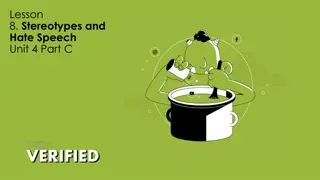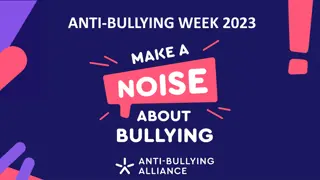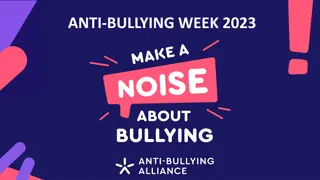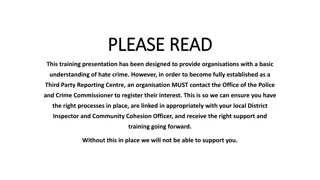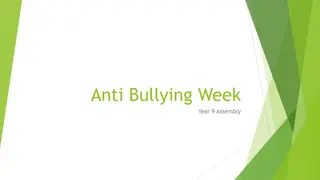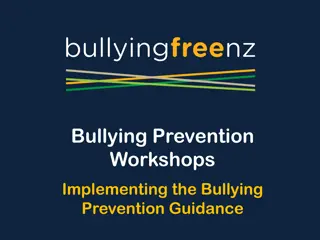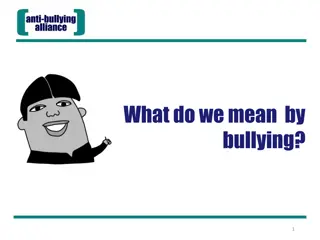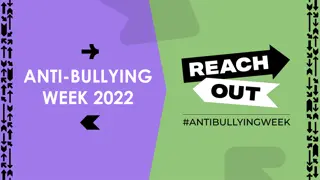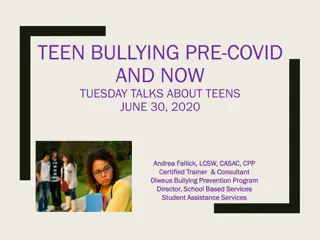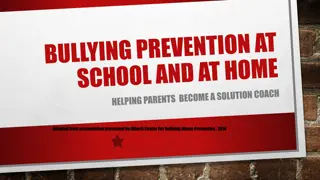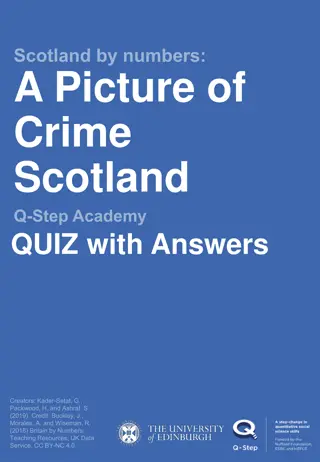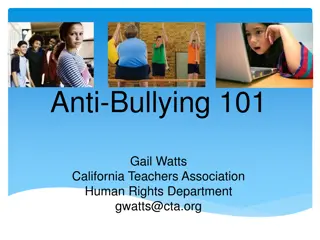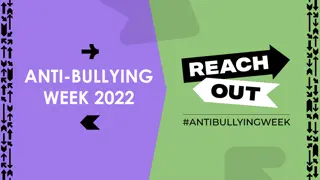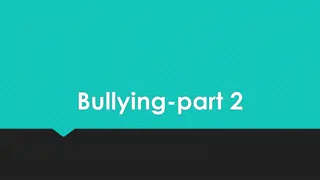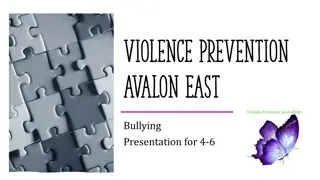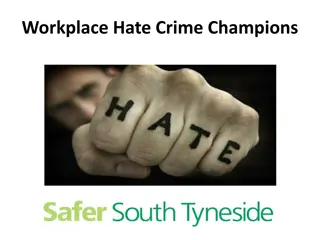Understanding Hate Crime and Bullying in Schools
Hate crime is legally recognized and can affect anyone, including children and adults. It is motivated by prejudice or hostility towards five protected groups. Hate crime can manifest through various forms such as physical assaults, verbal attacks, and online hate. Schools often address hate bullying, but serious offenses may involve the police. Recognizing signs of hate crime and providing support is crucial in creating a cohesive and understanding society.
Download Presentation

Please find below an Image/Link to download the presentation.
The content on the website is provided AS IS for your information and personal use only. It may not be sold, licensed, or shared on other websites without obtaining consent from the author. Download presentation by click this link. If you encounter any issues during the download, it is possible that the publisher has removed the file from their server.
E N D
Presentation Transcript
Parent / Teacher Notes What is Hate Crime? Hate Crime is: Hate Crime is recognised legally. When a Hate crime is first reported to the police it s flagged up as a Hate Incident . If there is then evidence that a crime has been committed and it is motivated by hostility or prejudice then it is recorded and treated as a Hate Crime. For the purpose of this unit we ll call it Hate Crime . Anyone can experience Hate Crime, that includes both children and adults. Hate Crime relates to 5 protected groups: Race Religion & Faith Disability Transgender Sexual Orientation You my have heard about Hate Crime . It s a type of bullying that is wrong and it can be reported to the Police. Hate Crime is when someone does something to hurt someone because of who they are. This might be the colour of their skin, their culture, their disability, their gender, their religion or who they love. Not all Hate Crime is reported. Organisations like Victim Support can offer help and support even if it s not reported to the Police. At Victim Support we work towards a society that is free from Hate, that is cohesive and promotes unity and understanding. This unit promotes that vision and raises awareness of Hate Crime. Answer: Both questions are true! Quiz Time! Q1. Hate Crime is a type of bullying. True or False? Q2. Hate Crime can be reported to the Police. True or False?
Parent / Teacher Notes What does Hate Crime look like? What does Hate Crime look like? Hate Crime can apply to any criminal offence, but is motivated by prejudice or hostility. It can range from physical assaults, verbal attacks, hate mail, online hate, criminal damage to properties or vehicles, harassment and threats. This can happen anywhere, but when we see it in schools we often refer to it as Hate Bullying. It is often dealt with by the school, however in some cases it can be reported to the police. For more serious offences, the punishment can be harsher if the hate element can be proved. You don t have to have a protected characteristic to be subject to hate, as the abuser can perceive you hold a characteristic and act on this presumption. Hate Crime can come in many different forms. It can be name calling or threats to hurt you, getting unkind or threatening messages through text, email or social media, being physically hurt by someone, damaging your belongings or when someone repeatedly tries to make contact with you in a way that makes you feel scared, upset or threatened. Hate bullying can sometimes be subtle and wont always be picked up by teachers and parents. We ve included some signs of what to look out for in this guide and tips for helping the child if you suspect it is happening to them. Q1. Hate Crime can only happen to people with a protected characteristic? True of False? Q2. Hate Crime offences are treated no differently to non Hate Crime? True or False? Quiz Time! Answer: Both questions are false!
Parent / Teacher Notes What can Hate Crime or Bullying look like in School What does Hate Crime look like? Hate Crime can manifest itself in many different ways and the impact can be far reaching. If a child is experiencing hate crime or bullying the whole family might be effected. The Ripple Effect How might my child be feeling? Fear of going to school making up excuses not to go in Guilt or self blame developing negative feelings about themselves Paranoia worry that everyone is talking about them Anxiety anxious about school related topics and friendships Social Isolation not speaking a lot about what happened at school or friends in school Denial of personal identity, changes of behaviour / appearance questioning their identity e.g faith or culture or trying to look different Lack of Trust with teachers or youth workers Mental Health Implications worsening low mood or distress Being left out of friendship groups, games or sports Being called abusive names or given abusive notes/graffiti on belongings Encouraging others to treat you differently Physical abuse (in school and on the way to/from school) Making fun of you Abuse on school transport Answer: False! Hate Bullying is never your fault! Quiz Time! Q1. If Hate Bullying happens to me its because of something I have done?: True or False?
Parent / Teacher Notes How schools can help What can schools do? If you think your child is being bullied you should inform the head teacher Under the Anti Bullying guidance schools should record any prejudice related bullying incidents to the local authority (https://gov.wales/sites/default/files/publications/2019-11/rights-respect-equality- statutory-guidance-for-local-authorities.pdf) They have a duty of care to protect and safeguard the child All schools should have an anti bullying policy Schools should apply disciplinary measures to pupils who bully Schools should have initiatives in place to encourage open and honest discussions around differences between people that could motivate bullying, such as religion, ethnicity, disability, gender identity or sexual orientation Schools should create a safe environment where pupils can openly discuss the cause of their bullying, without fear of further bullying or discrimination If you think this has been or is happening to you then you must tell someone. You can tell a teacher, your parent or carer or any other trusted adult. They can help stop it happening again and help stop it happening to other people. Q1. The school has a duty of care to protect children from bullying and harm? True or False? Q2. Schools should report all hate related bullying to the local authority; True or False? Quiz Time! Answer: Both questions are true!
Parent / Teacher Notes How can parents help? What can parents do? Its important to talk to your child and ask them what outcome they want. It may have been really difficult to tell you what has been happening and they may be feeling embarrassed and scared of getting worse. What you can do is reassure them that it is not their fault and never dismiss the bullying. You may feel anger, hurt, guilt, helplessness or fear and its important that you feel supported too. Below are some practical things you can do with your child: Write down things that have happened soon after they ve happened, including times, dates and (if possible) descriptions of the people involved. Keep evidence, such as any notes or letters, and don t delete abusive text messages, emails or voicemails. If you decide to report the crime, these can be used as evidence and may help to identify the person or people harming you. Even if you don t want to report it now, this could be useful later on. Help develop a safety plan that would help you choose how best to keep your child safe Telling your parents may seem overwhelming and scary but they will help you through what's been happening. Its normal to feel embarrassed or ashamed about what has been happening, but it is never your fault and you have no reason to be ashamed of who you are. Find some areas in school that feel safe or have school staff nearby Answer: Both questions are true! Quiz Time! Q1. Hate Crime is a type of bullying. True or False? Q2. Hate Crime can be reported to the Police. True or False?
Parent / Teacher Notes What if it s me? What if I think my child is being Hateful? It can be difficult for any parent to believe that their child is capable of bullying behaviour, especially hate bullying. It s important to remember that children can display different emotions and behaviour for a range of reasons. It may be tempting to hide the issue out of embarrassment, but the best way to address it is to act; If you know your child has been involved in hateful behaviour / bullying towards someone, make sure they apologise as soon as possible. Apologising reinforces the message to your child that what they ve done is wrong, and it will also help to lessen the impact on the person they ve hurt and will help them to rebuild relationships. Talk to your child about the feelings and thoughts they ve had. They may be acting on rumours or misinformation. Talk to your child s school. They may be able to help your child by reinforcing the messages from home, or by helping to rebuild friendships. Your Neighbourhood Policing Team may chat to your child too if you think that will make a difference you can contact 101 and ask to be put through to your local team. Try and keep an open environment at home, so your child feels comfortable talking to you about challenging issues such as hate. If you think that sometimes you can be the one who has said mean or unkind things then you can always fix it. If you feel like you don t like someone because of who they are, talk to your parent or carer about why you feel that way. Its good to know why you have these feelings so you can start to change your behaviour. Promote cohesion and unity at home. Encourage friendships with young people that are different to your child, talk openly and confidently about different protected characteristics so they become a normal part of life, rather than something to be feared. Quiz Time! Q1. If my child is behaving in a hateful way, I can seek help and support? True or False? Answer: True!
Parent / Teacher Notes Bouncing Back What support options are available? The support should be crucial in helping to support your child through this, however you can get additional support from Victim Support. We can support parents to help support their child through emotional and practical support. We can provide free and confidential services: Advocacy Police and School Liaison Reporting 3rd Party Reports Emotional Support for you to help support your child Confidence and resilience building Personal Safety My Support Space online support tool https://www.mysupportspace.org.uk/ You can also report what has been happening to the Police. If you want to report the hate crime to the Police you can call 101 in a non emergency to contact your local police force You can report Hate Crimes and Incidents directly to us if you do not wish to go the Police Victim Support are a Third Party Reporting Centre We can report to the Police on your behalf, or hold onto it until you feel ready You can remain anonymous and don t have to share anything you re not comfortable with Report online via our reporting tool www.reporthate.victimsupport.org.uk Overcoming Hate Crime and Bullying is something that can be done. You can get support from your family, friends, school, police and Victim Support. You don t have to suffer in silence and telling someone is always the first step to help making it stop. Q1. You have to report hate crime to the Police in order to get support from Victim Support? True or False? Q2. You can only report hate crime directly to the Police? True or False? Quiz Time! Answer: Both questions are false!
Parent / Teacher Notes Acting First How to promote Unity and Understanding Set good examples Children learn from what they see and experience in others. If you re promoting unity in all areas of your life, that s what they ll understand to be normal . So whether at home or in school, speaking confidently about groups with protected characteristics and demonstrating what people have in common and the value of different interests and backgrounds, will help to promote unity and understanding. See other people Whether at home or at school, surround your child with images and narratives of people different to them. Help them to see people, and the value that we each have to bring. Discuss the different countries family and friends come from. You can often map the influence of different cultures on the area you live through the restaurants, cafes and ice cream venues! Celebrate difference You can help children at home and at school to celebrate different cultural events and activities. It teaches children that their view of the world isn t the only one, but it helps them to see value in other people s cultures. Celebrate common ground Show children both at home and in school that people from different cultures often have lots in common. Think about the importance of family, food and traditions! We have lots in common with other people, even if they seem different to us. We live in a world filled with people from different backgrounds and cultures. We have more in common with them than sets us apart. Answer: Both questions are true! Quiz Time! Q1. We have lots in common with people from different cultures Q2. There s value in all the differences we have
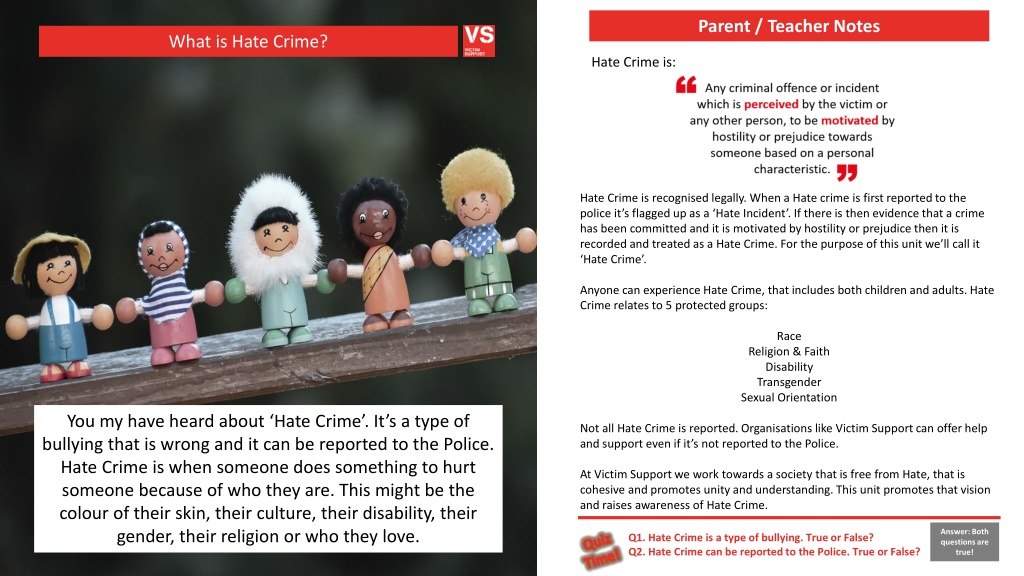

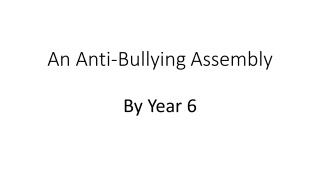
![Prevention and Combating of Hate Crimes and Hate Speech Bill [B.9B.2018]](/thumb/60513/prevention-and-combating-of-hate-crimes-and-hate-speech-bill-b-9b-2018.jpg)


